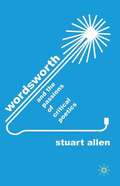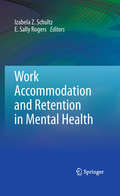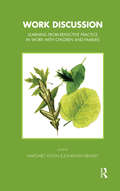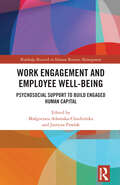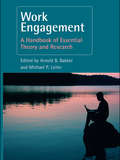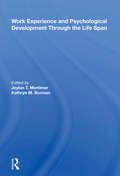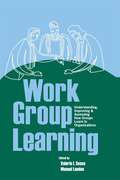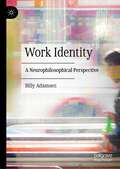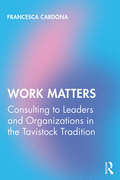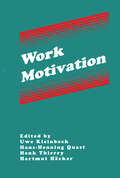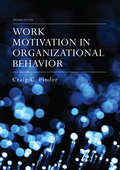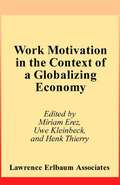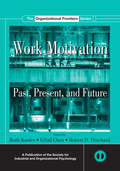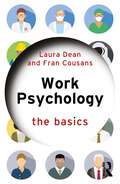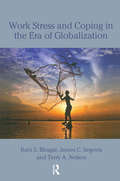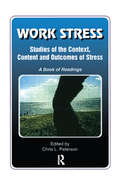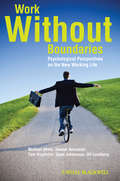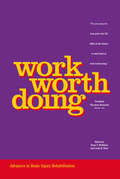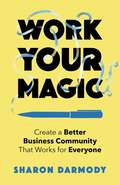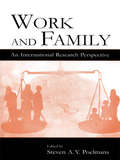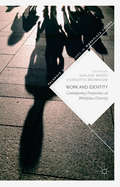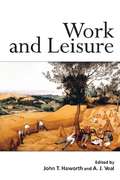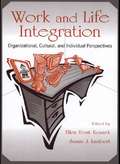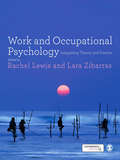- Table View
- List View
Wordsworth and the Passions of Critical Poetics
by Stuart AllenThis scholarly study presents a new political Wordsworth: an artist interested in 'autonomous' poetry's redistribution of affect. No slave of Whig ideology, Wordsworth explores emotion for its generation of human experience and meaning. He renders poetry a critical instrument that, through acute feeling, can evaluate public and private life.
Wordsworth’s Trauma and Poetry: 1793–1803 (Routledge Studies in Romanticism)
by Richard E. MatlakBased upon the testimony of Thomas Carlyle, most biographers acknowledge that Wordsworth witnessed the beheading of the journalist Antoine Gorsas in October 1793 during the Reign of Terror. But they go no further. This study reads the Poet’s reactions to the Terror in passages from The Prelude as explicitly about his twenty-three-year-old-self witnessing the gory deaths of Gorsas and others, which caused post-traumatic stress disorder and its symptoms, exacerbated by guilt for abandoning his French lover and their child a year earlier. Following a chronological arc from October 1793, when the trauma began, until its conclusion in October 1803, when Wordsworth became a poet-soldier, I examine poetic works from The Borderers (1796), the “Discharged Soldier’ (1798), the Two-Part Prelude (1799), Home at Grasmere (1800), and the Liberty sonnets (1803), to follow the Poet working through anxiety, fear, and remorse to a resolution.
Work Accommodation and Retention in Mental Health
by Izabela Z. Schultz E. Sally RogersGrowing interest in the field of mental health in the workplace among policy makers, clinicians, and researchers alike has been fueled by equal employment rights legislation and increasing disability statistics in mental heath. The importance of addressing this topic is underscored by the fact that depression now ranks second on the hierarchy of occupational disabilities. The problem is compounded by a host of factors, including major difficulties in job retention and productivity experienced by persons with mental health disabilities; younger age and higher education of persons with mental health problems; and labor shortages and an aging workforce in many industrialized countries. In addition, particularly in the United States, the vocational needs of army veterans returning from duty with mental health disorders require system-based solutions and new rehabilitation approaches. The pressure created by these powerful legislative, societal, and economic forces has not been matched by the state of evidence-based practices in the field of employment retention and job accommodation in mental health. Current research evidence is fragmented, limited in scope, difficult to access, and adversely affected by the traditional divide between the fields of psychiatry and psychology on one hand and interdisciplinary employment research and practices on the other. As a result, policy makers, employers, disability compensation systems, and rehabilitation and disability management professionals have been left without a critical "how to" evidence-informed toolbox for occupational practices to accommodate and retain persons with mental health disabilities in the workplace. Currently, no single source of knowledge and research evidence exists in the field that would guide best practices. Yet the need for workplace accommodations for persons with mental health disabilities has been growing and, based on epidemiological trends, is anticipated to grow even more in the future. These trends leave physicians, psychologists, occupational therapists, vocational rehabilitation professionals, disability managers, human resource professionals, and policy makers poorly prepared to face the challenge of integrating and maintaining persons with mental health disabilities in the workplace. The aim of the Handbook is to close the gap between the needs of the professionals and networks that work with or study persons with mental heath disorders in an employment context and the actual knowledge base in the field. The Handbook will be written in language that can easily be understood by readers representing a multitude of disciplines and research paradigms spanning the mental health, rehabilitation, and employment fields of inquiry. The Handbook will contribute an integration of the best quantitative and qualitative research in the field, together with experts' consensus, regarding effective work retention and accommodation strategies and practices in mental health. The book will consist of five major sections, divided into chapters written by recognized experts in these areas.
Work Discussion: Learning from Reflective Practice in Work with Children and Families (Tavistock Clinic Series)
by Jonathan Bradley Margeret RustinThis book provides the history, theory, and practice of work discussion as developed at the Tavistock Clinic. It describes the evolution and contemporary practice of work discussion in relation to a wide range of professional work with children, adolescents, and families.
Work Engagement and Employee Well-being: Psychosocial Support to Build Engaged Human Capital (Routledge Research in Human Resource Management)
by Małgorzata Adamska-Chudzińska Justyna PawlakWork Engagement and Employee Well-being highlights the vital role of psychosocial support in building and stimulating work engagement. It is a response to the growing phenomenon of weakened employee attachment and engagement instability. The authors underscore the importance of creating a friendly work environment, which accommodates a variety of employee needs and elicits positive emotions, thus fostering the well-being and complete engagement of employees.An in-depth literature review and empirical research conducted using combined qualitative and quantitative methods enabled the authors to present the issue from a wide range of theoretical perspectives. With a model acknowledging the multifaceted nature of work engagement and its association with well-being, the book introduces a selection of psychosocial means to enhance it. The analysis focuses on both systemic measures, that is, promoting a supportive organizational culture and protecting work–life balance, as well as a more individualized approach that not only facilitates the recognition and respect of employee needs but also helps cultivate their development. The book places emphasis on a transformational leadership style and a high level of emotional intelligence among managers, particularly their empathy. Further attention was paid to the various ways to support specific employee groups, such as remote workers and neurodivergent members of the workforce.
Work Engagement: A Handbook of Essential Theory and Research
by Arnold B. BakkerThis book provides the most thorough view available on this new and intriguing dimension of workplace psychology, which is the basis of fulfilling, productive work. The book begins by defining work engagement, which has been described as ‘an opposite to burnout,’ following its development into a more complex concept with far reaching implications for work-life. The chapters discuss the sources of work engagement, emphasizing the importance of leadership, organizational structures, and human resource management as factors that may operate to either enhance or inhibit employee’s experience of work. The book considers the implications of work engagement for both the individual employee and the organization as a whole. To address readers’ practical questions, the book provides in-depth coverage of interventions that can enhance employees’ work engagement and improve management techniques. Based upon the most up-to-date research by the foremost experts in the world, this volume brings together the best knowledge available on work engagement, and will be of great use to academic researchers, upper level students of work and organizational psychology as well as management consultants.
Work Experience And Psychological Development Through The Life Span
by Jeylan T MortimerThroughout the modern era, scholars have shown a continuing concern with the extent to which position in the occupational structure affects psychological development. This book examines whether work experiences and age (often considered as a proxy for stage in the work career) interact such that the effects of occupational conditions on the person
Work Group Learning: Understanding, Improving and Assessing How Groups Learn in Organizations
by Manuel London Valerie SessaThis contributed book shapes the emerging field of group learning by drawing on research from leading theoreticians and researchers. Author contributions aggregate existing theory and research and go beyond this foundation to examine new insights about how groups learn and what they learn, factors that influence group learning, learning interventio
Work Identity: A Neurophilosophical Perspective
by Billy AdamsenAt present, 80% of the employees are no longer engaged in their work and capable of performing, while 44% are experiencing work related stress and getting sick from working. A significant increase in time spent on interpretation at work trying to understand what managers and colleagues are saying has been observed too. This book offers a critical view on vocational inventory tests and the development of the work language and the use of it describing work identity. As well as a neurophilosophical perspective on self and work identity, this book provides a plausible neurophilosophical explanation for the negative impact of losing work identity on our work behavior, well-being, and success. Furthermore, the author introduces the innovative Work Identity Pro, the first work identity test to independently measure work identity. It will be of great interest to scholars and students of human resources management, organisation studies and organisational psychology. It will also be of interest to managers and those with an interest in work identity, behaviour and well-being.
Work Matters: Consulting to leaders and organizations in the Tavistock tradition
by Francesca CardonaWork is complicated: It can be fulfilling and exciting, or disappointing and disruptive. We spend most of our adult lives at work; it shapes our identities and provides a context for our creativity and talents. It can be the source of great pleasure – and of profound distress. In Work Matters, organizational consultant and Tavistock lecturer Francesca Cardona examines our changing relationship with work today. Drawing on case studies from a wide range of individuals and organizations, she considers the dynamics at play in our working lives. Cardona examines how to navigate times of transition, and the balance of power in the work place, while also addressing latent issues such as the effects of shame, the cost of ill-conceived organizational structures and tasks, the interface between the personal and the professional, and the manager’s most precious skill: the ability to be psychologically present. Finally, Cardona casts an eye on the consultant’s role in helping organizations move forwards in ways that are professionally and personally rewarding. Whether you are a business leader, manager, consultant or student, or simply interested in how your work affects you, Work Matters offers essential insights into an area that occupies so much of our lives.
Work Motivation (Applied Psychology Series)
by Uwe Kleinbeck Henk Thierry Hans-Henning Quast Hartmut HA unique compendium of international investigations into motivation and performance, this book offers chapters by industrial and organizational psychologists from the United States, Europe, Australia, and Japan as they share their theories, concepts, empirical evidence, and practical evidence regarding the subject. The volume focuses on three distinct themes: * the relationship between motivation and performance * practical examples of building and strengthening the motivating potential with particular attention paid to productivity and the health of the employees * the development of work motivation over time and the change of the relative importance of central variables Work Motivation provides an exceptional blend of modern theoretical approaches, technologically sound techniques for solving practical problems, and empirical results to prove theoretical and technical validities.
Work Motivation in Organizational Behavior: Theory, Issues And Applications (Scott, Foresman Series In Organizational Behavior And Human Resources Ser.)
by Craig C. PinderThis second edition of the best-selling textbook on Work Motivation in Organizational Behavior provides an update of the critical analysis of the scientific literature on this topic, and provides a highly integrated treatment of leading theories, including their historical roots and progression over the years. A heavy emphasis is placed on the notion that behavior in the workplace is determined by a mix of factors, many of which are not treated in texts on work motivation (such as frustration and violence, power, love, and sex). Examples from current and recent media events are numerous, and intended to illustrate concepts and issues related to work motivation, emotion, attitudes, and behavior.
Work Motivation in the Context of A Globalizing Economy
by Miriam Erez, Uwe Kleinbeck and Henk ThierryWork Motivation in the Context of a Globalizing Economy evolved from a work motivation conference held in Israel, attended by a group of internationally renowned scholars. These scholars were given the charge of creating a vision of motivation research for the 21st century. Coming from different parts of the world, the scholars represent a wide range of perspectives from the very micro focus on the individual level of motivation, through the meso level of groups and organizations, and up to the macro level of culture. The authors provide an entry to the book by summarizing several mega-trends manifest across all of the chapters and identifying several emerging trends that are left for future research.
Work Motivation: Past, Present and Future (Siop Organizational Frontiers Ser.)
by Robert D. Pritchard Ruth Kanfer Gilad ChenThis edited volume in SIOP's Organizational Frontiers Series presents the current thinking and research on the important area of motivation.Work Motivation is a central issue in Industrial organizational psychology, human resource management and organizational behavior. In this volume the editors and authors show that motivation must be seen as a m
Work Psychology: The Basics (The Basics)
by Laura Dean Fran CousansWork Psychology: The Basics provides an accessible, jargon-free introduction to the fundamental principles of work and occupational psychology. Covering key theories and models in this dynamic area, it offers a solid understanding of both academic theory and practical applications. The book follows the structure of the British Psychological Society curriculum for Masters courses, exploring psychological assessment at work, learning, training and development; wellbeing at work, work design, organisational change and development, and leadership, engagement and motivation. These core topics are supplemented by deep dives into the development of the discipline, research and practice in the field, and suggestions for the future of work psychology. Giving a detailed look into the world of work, it answers questions such as: Can we accurately select people for jobs? How can work positively and negatively affect mental and physical health? How can we motivate people in the workplace? What makes a good leader? It also explores issues around types of research and what effective research looks like in this area. Supported by a helpful guide on the routes to chartership in the UK and working in the area, as well as a glossary of key terms and suggestions for further reading, this is the ideal introductory text for students. It will also interest those looking to understand the subject more generally and complete training in the area.
Work Stress and Coping in the Era of Globalization
by Rabi S. Bhagat Terry Nelson James SegovisThis book examines the phenomena of how individuals experience work stress and coping in both developed and developing countries in the world. Rabi Bhagat, known for his cross-cultural scholarship in this area, and his co authors, help us recognize the causes and consequences of work stress. They present a systematic, comprehensive review of this topic with plenty of practical insights and case studies examining work stress and coping in the era of globalization. Researchers, practitioners and students in the field of industrial organizational psychology, organizational behavior, and human resources management will find this book of interest.
Work Stress: Studies of the Context, Content and Outcomes of Stress: A Book of Readings
by Chris PetersonSociologists and health experts from the U.K., Scandinavia, Australia, and the U.S. discuss issues surrounding stress in the workplace, including its causes and ways in which jobs can be designed to minimize it. The book is intended for professionals and students in occupational health and safety.
Work Without Boundaries
by Michael Allvin Gunn Johansson Gunnar Aronsson Tom Hagström Ulf LundbergDrawing on more than a decade of inter-disciplinary research, this book provides a comprehensive overview of the available theories, concepts, data and research on new work organizations and the concept of 'work without boundaries'.Explores a concept of work that is not restricted by traditional organizational rules like regular office hours, a single workplace, fixed procedures and limited responsibilityProvides a comprehensive overview of the available theories, concepts, data and research on new work organizationsExamines the shift of power away from organizations to make individuals accountable for their own employability and workDraws on over a decade of original research into 'work without boundaries' in which the authors are key authoritiesBrings together organization theory and work psychology with scholarship from related fields including sociology, social psychology, cognition and psychobiology
Work Worth Doing: Advances in Brain Injury Rehabilitation
by Linda R. Shaw Brian T. McmahonPresident Theodore Roosevelt once said, "Far and away the best prize that life offers is the chance to work hard at work worth doing." This quote is not only the source from which the title was borne, but also the philosophical approach toward TBI rehabilitation embraced by the 26 rehabilitation experts who wrote Work Worth Doing: Advances in Brain Injury Rehabilitation. This important, and possibly controversial, book of issues and methods addresses the full spectrum of vocational rehabilitation activities. Independent living, treatment generalization, criteria for evaluating TBI rehabilitation facilities, family involvement issues, and an entirely new perspective on the TBI rehabilitation industry are discussed.
Work Your Magic: Create a Better Business Community That Works for Everyone
by Sharon DarmodyThe fallout from the pandemic has yet to be measured, but the way we work will never be the same again. In this accessible, interactive guide, longtime organizational coach and consultant Sharon Darmody reveals what a unique opportunity this has presented to rebuild our working lives from the ground up—to make work work again—and shows readers how to do just that.
Work and Family: An International Research Perspective (Applied Psychology Series)
by Steven A. Y. PoelmansThe entrance of women into managerial positions in significant numbers brings work and family issues to center stage, shifting the spotlight from issues of entry and equality of access to the consideration of the work-family conflicts and the difficulties posed on female managers. Looking at new approaches to enhance the work-family interface individually and in the firm, Work and Family: An International Research Perspective:*provides an overview on the antecedents of work-family conflict and the major consequences of work-family conflict, for well-being, productivity, and the strength of the relationship with the firm;*discusses the migrant's work and family experiences in terms of the demands, opportunities, and constraints they face and the role of work-family culture in reconciling the demands of work and family in organizations;*presents descriptive data concerning the linkages between work-family pressure and several known correlates and the differences in reported levels of each of these variables;*explores the work-life balance challenges and opportunities created by global assignments;*examines the work-family interface of the Western model and urban sub-saharan Africa;*emphasizes the importance of organizational change to the dynamics of work-family policies; and*highlights the progress in moving the field toward an open-systems perspective.Written by well-known contributors, this book offers international research in order to test the models mostly developed in the United States. In addition, it develops new models to capture the complexity and diversity of work-family experiences around the globe and explores cross-cultural topics.
Work and Identity: Contemporary Perspectives On Workplace Diversity (Palgrave Explorations In Workplace Stigma Ser.)
by Charlotte Brownlow Shalene WerthThis edited volume highlights relevant issues and solutions for diversity groups within the workplace. It explores issues of identity as they relate to attributes of gender, age, migrant labor, disability, and power in social spaces. Identity is rarely well-defined in many social spaces, and understandings that define belonging are often developed through the normative expectations of others. Having an evidence-based approach in addressing these relevant issues, this book will appeal to academics and practitioners alike looking for practical and theoretical solutions to improving the situations of these groups in paid employment.
Work and Leisure
by A. J. Veal John T. HaworthGlobalization, economic development and changes in social environments have put the relationships between work, leisure, social structure and quality of life under the spotlight. Profound transformations in the nature and organization of work are occurring, with potentially far-reaching social and economic consequences. Increasingly, organizations demand greater flexibility from their workforces and are introducing new technologies and practices in response to global competitive pressures. At the same time many employees are experiencing long working hours, increasing workloads and job insecurity, along with the challenge of balancing work and domestic responsibilities. These changes threaten long-term gain in leisure time while, simultaneously, the leisure environment is also changing radically, as we see increasing commercialization and professionalization of leisure services and experiences, the influence of the Internet, the rise of gambling and the decline of community-based activity. Exploring all of these issues, this book brings together specially commissioned chapters from international experts in a wide range of disciplines concerned with work, leisure and well-being. Each author takes stock of the current position, identifies core practical and theoretical issues and discusses possible future trends in order to provide an invaluable resource for all policy-makers, educators, employers and researchers in the field.
Work and Life Integration: Organizational, Cultural, and Individual Perspectives (Applied Psychology Series)
by Ellen Ernst Kossek Susan J. LambertWork-family researchers have had much success in encouraging both organizations and individuals to recognize the importance of achieving greater balance in life. Work and Life Integration addresses the intersect between work, life, and family in new and interesting ways. It discusses current challenges in dealing with work-life integration issues and sets the stage for future research agendas. The book enlightens the research community and informs the public debates on how workplaces can be made more family sensitive by providing contributions from psychologists, sociologists, and economists who have not shied away from asserting the policy implications of their findings.This text appeals to both practitioners and academics interested in seeking ways to create meaningful lives.
Work and Occupational Psychology: Integrating Theory and Practice
by Rachel Lewis Lara ZibarrasWork and Occupational Psychology is the ideal companion for any student of the field, whether they are studying for a postgraduate qualification with a view to working in OP, or taking the subject as part of a wider degree programme at any level.<P><P> Written by a team of experts and with contributions from seminal academics and leading practitioners, this text provides the concise link between theoretical learning and the key practical skills needed to increase your grades and your employability.<P> Features of this book include:<P> - Structured around the eight core areas of Occupational Psychology to ensure a rounded overview and enables students to dip in and out of the text<P> - Assumes no prior knowledge of the subject making it ideal for anyone studying Occupational Psychology for the first time<P> - Provides a contemporary and future-facing account of the field, including cutting edge research and reflections on future of Occupational Psychology<P> - Reflects the realities of a global workplace through discussion of international and cross-cultural issues and a range of international case studies<P> - Engages critically with the subject to encourage analytical thinking<P> - Comes with a range of accessible in-text and online learning features including essay/exam questions, access to full text SAGE journal articles, podcasts and a glossary.<P> Visit the Companion Website at www.sagepub.co.uk/zibarras
